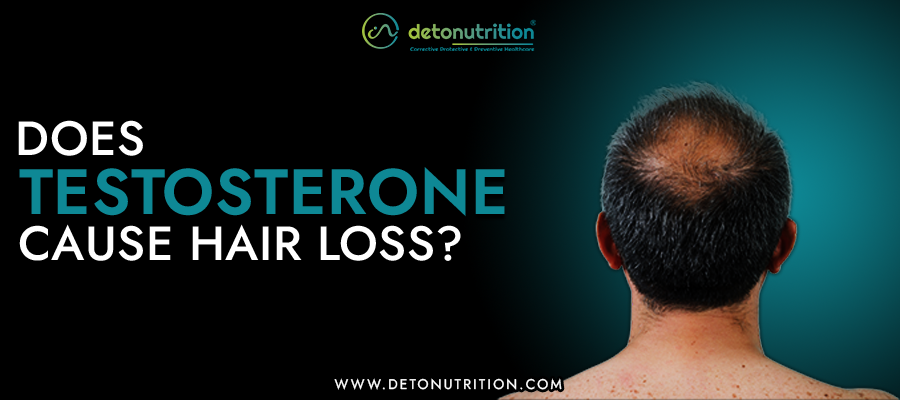Does Testosterone Cause Hair Loss?
Mens Health Testosterone Booster
Hair loss is a common concern for men in India, and many believe testosterone is the one to be blamed. But is there a direct link? The answer, like most things in health, is not very simple and clear cut. Let's explore the details by understanding the science behind testosterone and hair loss, clarify some myths, and figure out solutions specific to Indian men.
Hair loss happens when hair follicles shrink, disrupting their natural growth cycle. This leads to progressively finer hairs until growth eventually stops and the follicles become inactive. Genetics and hormones are the key culprits.
It's not the sheer quantity of testosterone or DHT (a testosterone byproduct) that triggers baldness, but rather how sensitive your hair follicles are to them. This sensitivity is predetermined by your genes. The AR gene creates receptors on hair follicles that interact with these hormones. If these receptors are hypersensitive, even small amounts of DHT can trigger them, leading to more rapid hair loss. Other genes may also be involved.
While factors like age and stress can influence hair loss, genetics play a major role. Men with close male relatives experiencing male pattern baldness (MPB) have a significantly higher chance of developing it themselves.
Read This Article - How To Increase Muscle Pump At Gym
Testosterone 101: The Male Hormone Powerhouse
Testosterone, the primary male sex hormone, plays a crucial role in:
- Muscle growth and development
- Bone health
- Sex drive and libido
- Sperm production
- Facial and body hair growth
The DHT Connection
While testosterone gets the blame for hair loss, it's actually a converted form called Dihydrotestosterone (DHT) that's more directly involved. Here's the breakdown:
- A small percentage of testosterone is converted to DHT by an enzyme called 5-alpha reductase (5AR).
- DHT binds to receptors on hair follicles in the scalp, particularly the crown and forehead areas.
- In genetically predisposed individuals, this binding shrinks hair follicles, shortening the hair growth cycle and leading to finer, thinner hair over time. This is known as androgenetic alopecia, or male pattern baldness.
So, Does High Testosterone Cause Baldness?
Not Exactly.
Here's the key takeaway: High testosterone levels don't directly cause hair loss. It's your genetic sensitivity to DHT that matters.
1. Genetics Dictate Sensitivity
Genes determine how receptive your hair follicles are to DHT. If you have a family history of baldness, you're more likely to be susceptible.
2. It's All About Balance
Even with normal testosterone levels, high DHT sensitivity can lead to hair loss. Conversely, some men with high testosterone may not experience baldness if their follicles aren't sensitive.
Read This Article - How The Ingredients Of Herbal Testosterone Booster Help In Muscle Growth?
Hair Loss in Indian Men: Unique Considerations
While male pattern baldness is universal, there might be factors specific to the Indian population:
1. Onset
Studies suggest Indian men might experience hair loss earlier than their Western counterparts.
2. Diet and Lifestyle
Nutritional deficiencies, stress, and unhealthy habits can contribute to hair loss alongside genetic factors. Detonutrition’s Testosterone Boosting supplements are a great way to make up for the lost nutrition which maybe impacting your bodily health. The best part is that they are prepared using all natural plant extracts including saffron, piper longum, and other power packed herbs to boost health, safely.
3. The Natural Approach
Traditional Indian medicine offers herbal remedies like ashwagandha and bhringraj, which may promote hair growth – consulting an expert will be better before diving in.
Combating Hair Loss: Solutions for Indian Men
If you're experiencing hair loss, here are some options to consider:
1. Finasteride and Minoxidil
These medications are the gold standard for hair loss treatment. Finasteride blocks the conversion of testosterone to DHT, while Minoxidil stimulates hair growth. Talk to a dermatologist about their suitability for you.
2. Low Level Laser Therapy (LLLT)
This non-invasive treatment uses light to stimulate hair follicles and promote growth. Research suggests it may be beneficial, but consult a doctor to understand its effectiveness.
3. Scalp Micropigmentation
This cosmetic procedure creates the illusion of a fuller head of hair using tiny dots of pigment tattooed on the scalp.
4. Hair Transplant Surgery
This surgical procedure involves transplanting hair follicles from a donor area to the balding area. It's a costly yet permanent solution but requires a consultation with a qualified surgeon.
Remember
Early intervention is the key. If you notice hair thinning or receding hairline, consult a dermatologist. They can diagnose the cause of your hair loss and recommend the most effective treatment plan.
Taking Charge of Your Hair Health
Hair loss can be a confidence concern, but with the right knowledge and approach, dietary considerations supplementing your good health, you can take charge. By understanding the role of testosterone and DHT, exploring treatment options, and considering factors specific to Indian men, you can find solutions to maintain a healthy head of hair.





